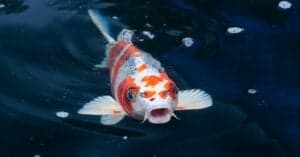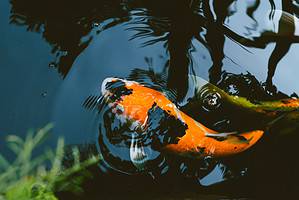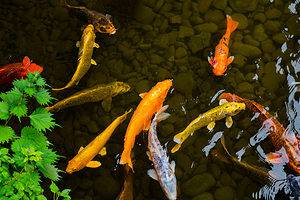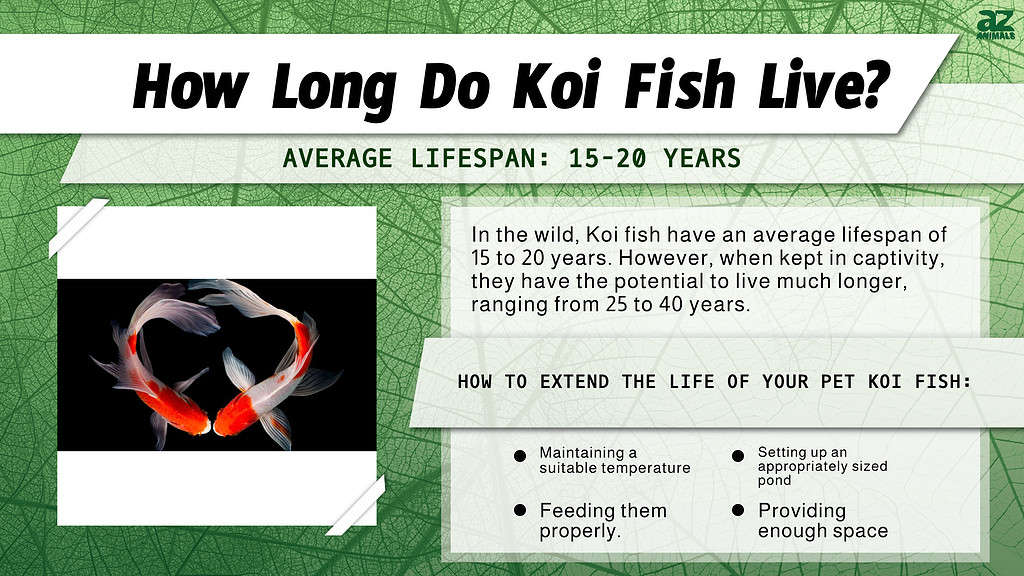
Koi fish, known for its brilliant hues, is one of the most recognizable fish types. Their color is what has made them such a popular choice of pet for many fish owners. You could almost call a koi fish the adult version of a goldfish.
Along with their beautiful exterior, koi fish have also been symbolically associated with good luck, strength, and courage. So if you’re captivated by this beautiful fish, take some time to learn more about the koi fish lifespan and life cycle.
Let’s discover what makes koi fish so amazing!
A Quick Crash Course On Koi Fish
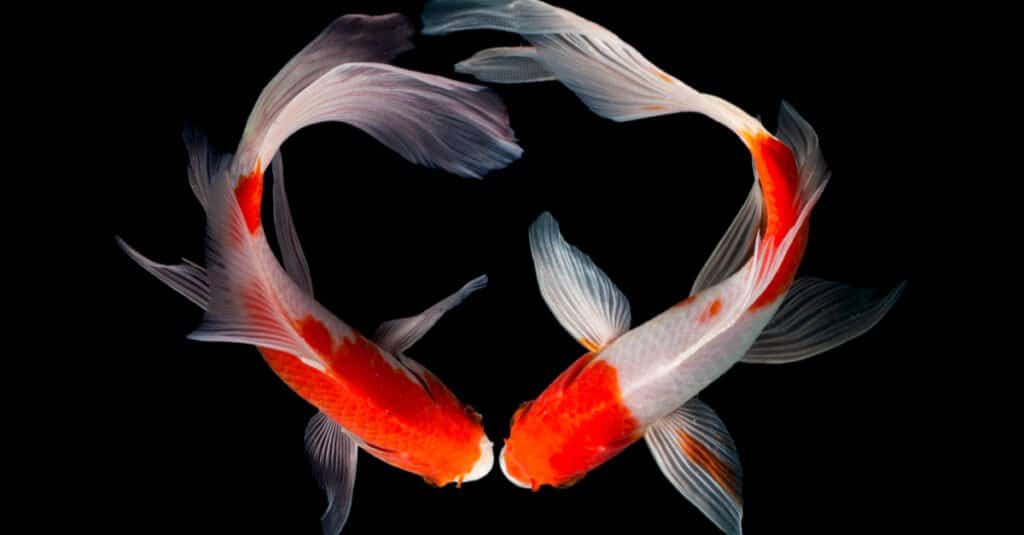
Koi originated in Japan.
©koifish/Shutterstock.com
Koi fish is a species of carp. They are found in freshwater bodies of water or ponds. Domestication of koi carp began in 4th century China. Today, there are more than 100 varieties of Koi, with many others still undiscovered.
While many might assume that it’s only a koi’s exterior that makes them a popular pet, that’s only half the story. Koi fish are actually quite intelligent. Like other fish, koi may identify their owners if they are cared for on a regular basis by the same person or people. They have also been known to recognize their own names and accept being stroked by their owner. They are also quite gentle and typically are never aggressive towards humans.
Now that we better understand the koi fish, let’s learn more about the average koi fish lifespan.
The Average Koi Fish Lifespan
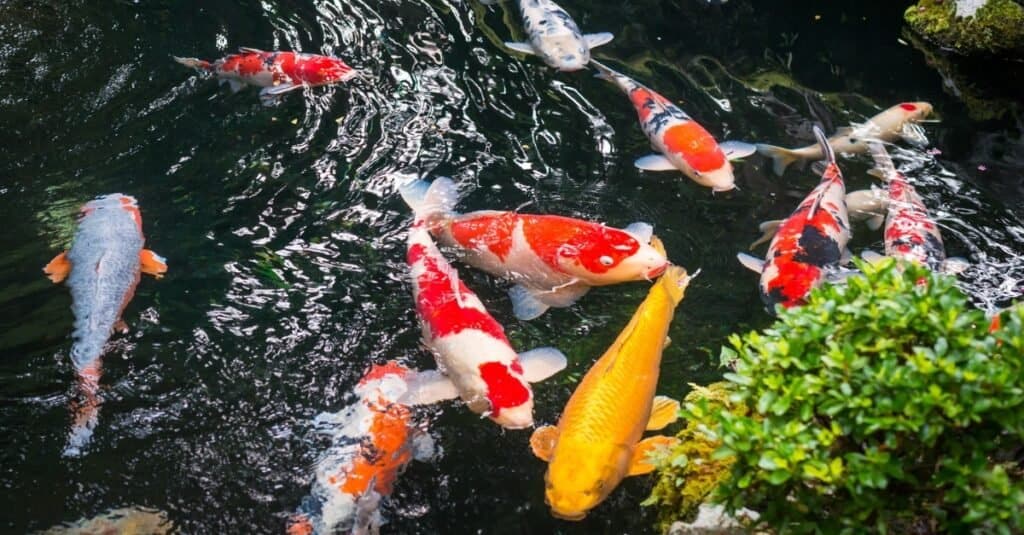
The rings around a Koi’s outer scales indicate its age: one ring for every two years.
©M_MUC1968/Shutterstock.com
The average Koi fish lifespan is between 15-20 years in the wild. However, in captivity, they can live between 25-40 years.
According to the 2016 International Seminar on Application for Technology of Information and Communication (ISemantic), “there are some that can live up to 200 years.” In fact, the world’s oldest documented koi fish was Koi Hanako. Born in 1751, Koi Hanako lived to be 226 years old, having passed away on July 7, 1977. Not only was Hanako the oldest koi fish, but she was also the oldest freshwater fish to ever live.
Now that we have a better understanding of the koi fish lifespan, let’s learn more about their life cycle. Whether you’re interested in having your own koi fish or are simply interested in them, we’ll go into detail on how they go from baby to adult.
The Koi Fish Life Cycle Explained
Interested in the steps it takes for a koi fish to become the brilliantly colored adult? Let’s go over the details of the koi fish life cycle. These fundamentals are also useful if you accidentally wind up having to take care of koi fry that has been produced from your older fish.
Spawning
Koi fish do not give birth to live babies. Instead, they lay eggs in a process called spawning. When a female is interested in beginning the spawning process, she will begin to put together something similar to a nest. This catches the male’s attention. Once mating has been completed, the female koi fish will lay her eggs. After the eggs have been released, they will stick on to whatever surface they land on. The male fish will then fertilize the eggs.
After Spawning
Once spawning has been completed, it is important to remove the koi parents from the water. This is because male koi fish can be aggressive and cannibalistic towards their eggs and the female koi fish needs time to recuperate. Healthy eggs are transparent, but infertile eggs are opaque and milky in appearance. The eggs will hatch within a week of being laid.
Fry
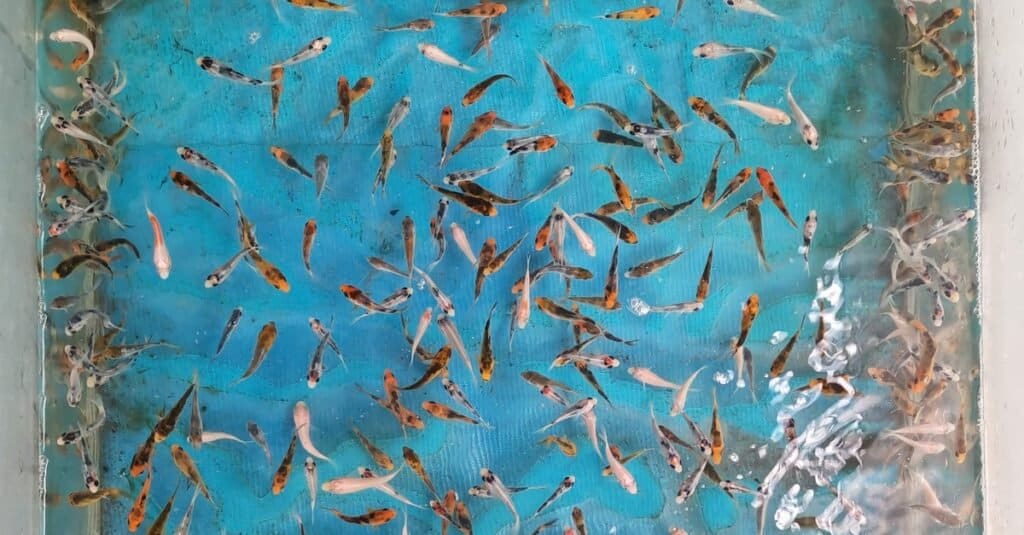
Baby koi fish are called fry.
©phasaluka/Shutterstock.com
Fry is what newly hatched koi fish are called. Because they can’t swim right away, they’ll hide in plants or other safe places to avoid becoming the next meal of an adult fish. The fry will survive on the yolk sack connected to them at birth. As they continue to grow and get bigger, they may also begin to eat other smaller fry.
Adult Koi
Koi fish typically reach full sexual maturity around the ages of 2-3 years old. By the end of its first year, a koi will be between 6 and 8 inches long, and by the age of three, it will have achieved full adult size.
How To Extend The Life of Your Pet Koi Fish
Fish are often easier and less costly to properly care for than other pets. This is why they continue to be such a popular pet choice for many people. However, although they are typically less high-maintenance than other pets, they still require a suitable habitat and capable caregivers. If you’re interested in taking care of koi fish yourself, then these are the best tips to extend your koi fish’s lifespan.
- Maintaining a suitable temperature is key. Koi are extremely climate-tolerant. They have even been known to hibernate under the ice in the winter. However, koi fish aren’t tolerant enough to withstand icy cold temperatures, especially if the water in your koi fish pond freezes over. Purchasing a heater for the winter months is necessary to keep the koi alive. Ideally, the best temperature for koi fish is anywhere between 65 and 75 degrees Fahrenheit.
- Setting up an appropriately sized pond is essential. Your koi fish will require a lot of space. After all, they are pretty large fish and they need a lot of space to swim around. One inch of fish per ten gallons is a good starting point. Large koi ponds are ideal if you are interested in keeping several fish.
- Feeding them properly. When looking to expand the koi fish lifespan, their diet is one of the most important factors. Without the right diet, your koi fish will not grow into the beautiful colorful fish that you desire. Koi fish are omnivores, meaning they require both meat and vegetables. Be sure to feed them a diet of mealworms, brine shrimp, and plenty of vegetables to ensure they have all they need. You can also feed them high-quality koi fish food as well.
The photo featured at the top of this post is © PokkO/Shutterstock.com
Thank you for reading! Have some feedback for us? Contact the AZ Animals editorial team.



